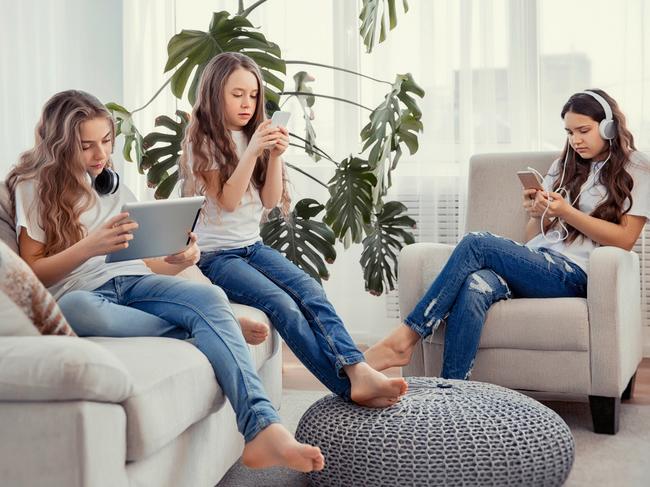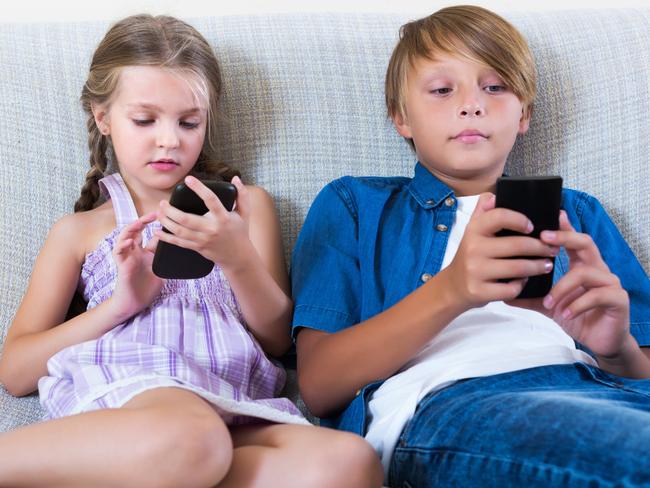How to save your kids from too much ‘toxic’ screen time
STUDY after study points to screen time as a significant predictor of decreased mental health in young people. Parents need to control the use of devices to ensure happy, healthy kids, Australia’s leading parenting writer Dr Justin Coulson says.
Parenting
Don't miss out on the headlines from Parenting. Followed categories will be added to My News.
- Using tracking apps on your kids will break their trust
- How to tell another parent their child is smoking
IN A 2018 survey half of the parents questioned believed smartphone use negatively affected their child’s mental health. Nearly half thought their child was addicted to the device.
The parents are right. Study after study points to screen time as a significant predictor of decreased mental health in young people. And parents instinctively know this: something isn’t right with too much screen time.
Our kids aren’t themselves — they might get despondent, irritable or aggressive. It’s concerning, but sometimes we wonder what can we do about it? It’s the way of the future after all.
It shouldn’t be. From the 1960s to the 2000s, measures of wellbeing rose consistently, especially for teens. This data measures things like self-esteem, happiness, job satisfaction and friendships.
From 2012, however, the trend has started to reverse and the data shows wellbeing steadily decreasing.

That is also the year smartphone ownership tipped over to the majority of mobile phone users. It’s the year that their use became widespread among teenagers. And, it’s the year data shows a surge in depression, anxiety and suicide among our teens.
A new study shows this is not just coincidence. More than 1.1 million young people answered questions on their wellbeing and screen time. The data showed too much screen time is toxic.
Teens who spend more time on screen activities are more likely to be unhappy, depressed, anxious and even suicidal. In fact, nearly half of teens who spent five or more hours a day on a device had contemplated, planned or attempted suicide at least once.
MORE FROM DR JUSTIN COULSON
10 TIPS TO BEING A GOOD PARENT
WHEN TO LET YOUR CHILD STAY HOME ALONE
Our teens are in the midst of a mental health crisis, and screens are a big part of the problem. (To be clear, screens are not the problem, nor are they the only problem. But they are a genuine contributor.)
But it’s not all bad news. University of Oxford researchers have discovered there is a point between low and high use of technology that is “just right” for our teens.
This is the magical intersection where digital connection can increase creativity, communication and development, and where wellbeing is boosted rather than harmed. This is the “Goldilocks Zone”.

But where is this zone? What is the right amount of screen time for our teens? Unfortunately there is no hard and fast answer.
It varies, depending on the child and the device, and whether it’s a weekday or a weekend, and depending on what other activities your child is missing out on in favour of screen time.
It’s our job to help our teens use screens in a way and in an amount that boosts their wellbeing.
There are guidelines that can help us do just that.

USE YOUR COMMON SENSE: As parents, you know your children best. Trust yourself. Be discerning and exercise your own good judgment when it comes to screen time.
CONSIDER CONTENT AND CONTEXT IN DETERMINING LIMITS: While some people get caught up on “how much” screen time is OK, my preference is to focus on “what type” of screen time is best.
If their screen diet is junk, keep it short, just like you limit the amount of sugar they eat. If they’re doing valuable and legitimate learning or truly useful social things, be more flexible.
Content matters. So does context. It’s not OK to have screens in rooms or at the table. You may have other rules too. The context should determine whether kids are OK to be on screens. Friends over? No screens! Chores done, homework done, and reading done? Sure, have some fun on screens.
When considering all the things our kids are missing out on when they are on screens — time to develop and deepen relationships, to be creative and to engage in physical activity — we want to be intentional about how and when screens are used.
ENCOURAGE OTHER ACTIVITIES: When your kids ask to play video games or use the tablet, have a list of things ready to suggest instead. Have you played outside? Have you spent time with a friend? Have you read a book? Have you tidied your room?
What you suggest, and how firmly you suggest it, is up to you. But by engaging in these types of activities, children will do much more for their brains, their bodies and their wellbeing then sitting in front of a screen.
Active, positive use of screens should be encouraged, but as parents we know when enough is enough. And certainly our teens have had enough.
